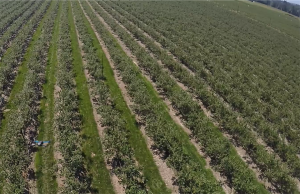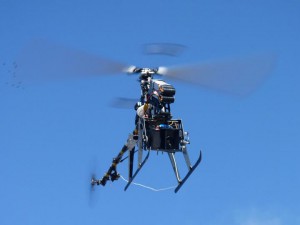UAVs as Pest Bird Deterrents
By Miranda Elsby
A new multidisciplinary team of drone and technology experts from gUAVas Technologies are hoping to offer a pest bird deterrence solution to BC’s blueberry growers that goes beyond what is currently provided by other UAV (unmanned aerial vehicle) projects.

Growers in the area are all too aware of the damage that can be caused by a roosting flock of birds that target a field of ripening blueberries. A group of starlings can easily pick clean a crop if the farmer isn’t taking protective precautions, such as netting or the controversial propane cannon. This kind of crop loss can financially devastate farmers, who have a whole host of other production challenges being thrown at them throughout the season.
The team hopes that its innovative drone technology can help to make unneighbourly cannon noise pollution, inhumane bird culling, and cumbersome and expensive bird netting a thing of the past for BC’s blueberry growers.
Over the past summer, the team extensively field tested the drones on several blueberry farms scattered across the Lower Mainland. A combination of raptor-mimicking flight patterns, visual scare tactics, and noise deterrence were tested, as well as recent technological advances that allow the drones to be deployed, flown, and landed, all by remote (off-field) control.

The ability of the drones to be truly unmanned is a huge milestone for the team, as this was an area where other UAV projects fell short on their ability to help growers in a cost-effective way. Other projects in the past have always required the presence of a pilot in the field in order to deploy and land the drones, which quickly becomes an unrealistic specialized labour cost for farmers. Cloud-based control allows the pilot, crop consultant, or even farmer to select a pre-programmed flight pattern and deploy the drone from afar. More improvements are planned before the start of the next field season, which are sure to make the technology even more easily accessible to farmers.
As the drones’ success is proven in the Lower Mainland over the coming seasons, the solution platform will ideally spread to other growing regions with high value crops also suffering from crop loss due to pest birds. This includes grapes, raspberries, strawberries, cherries, and apples, each of which constitute a huge component of BC’s agricultural wealth and export market. Grower group cooperation is already underway, including support and interest from the BC Blueberry Council, BC Cherry Association, and the BC Tree Fruits Cooperative.
Further opportunity exists with this type of drone technology, including the capture of meaningful crop sensing data using multispectral and hyperspectral remote sensing. This is not a new concept, but using it simultaneously with bird scaring flight patterns increases the drones’ efficiency and value to the grower. This type of sensing can help to pinpoint areas of nutrient or drought stress in the field, as well as detect disease and insect infestation, including the notorious Spotted Wing Drosophila fly (SWD).
The team at gUAVas Technologies welcomes involvement from local producers, grower groups, crop consultants, and industry experts in deploying this technology to the industry in an impactful and meaningful way. For more information, please contact Chris Mitchell at chris@guavas.info.
[infobox title=’Miranda Elsby’] Having grown up on a family dairy farm in the Fraser Valley, Miranda has strong ties and motivations to contribute to the local and global agriculture communities. She holds a Production Horticulture Diploma from Olds College, as well as course work in conservation sciences and a BASc in Horticulture from UBC. She has a special interest in crop management research and hopes to contribute to this innovative field throughout her career.[/infobox]
Having grown up on a family dairy farm in the Fraser Valley, Miranda has strong ties and motivations to contribute to the local and global agriculture communities. She holds a Production Horticulture Diploma from Olds College, as well as course work in conservation sciences and a BASc in Horticulture from UBC. She has a special interest in crop management research and hopes to contribute to this innovative field throughout her career.[/infobox]












